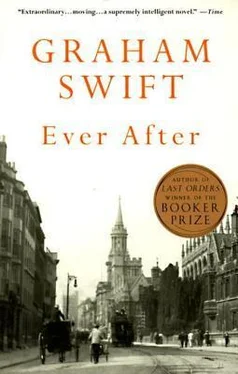And the marriage must have been blessed and happy and Matthew’s animal nature must have been nothing lacking, because between 1847 and 1853 Matthew and Elizabeth produced four children: John, Christopher, Felix and Lucy. And when in 1854 he began his Notebooks, after the death of Felix, Matthew would refer to this whole period as “the ten happiest and most fragile years of my life.”
I see Matthew tiptoe from the side of a cot. Of two cots … I see him blow out candles; open the little brass plate and wind the clock. He watches Elizabeth at her dressing-table as she loosens her hair. She smiles at his watching smile in the mirror. And he resolves once again — though by now, perhaps, the resolve has become a reflexive, unconscious, continuous thing — not to tell her, to lock up his thoughts. It sometimes seems to him that that very smile of hers is like a warning finger raised to her lips (the way she does it with little John and Christopher), bidding him not speak, not spoil things. She brushes her hair. He feels a tug, like an anchor-chain, at his heart. And beyond the window, in the middle distance, hidden now in the dark, is Burlford church. If Elizabeth is the anchor, there is the harbour wall. And every night now (for they are living at Leigh House, on the edge of Burlford village) the chimes from the solid old tower steal across to them over Rectory Meadow.
No, I don’t believe he ever told her about that afternoon in Lyme. He kept quiet, as the Rector kept quiet about the misquoted Virgil. Perhaps he meant to tell her. Many times, perhaps, especially in those months before they were married — to get it over with, to exorcise the ghost! — he would have looked for the right moment. But his mouth would have been stopped by her innocent unsuspectingness, then by the innocent unsuspectingness of John and Christopher, and by the simple safety of silence. So that the not telling became in the end a duty for her sake, for her protection, a measure of his devotion. And, anyway, how did you begin? An ichthyosaur … And with each non-disclosure the eventual utterance became less probable, less plausible. The more it hung back from his lips, the more it receded from the front of his mind. And perhaps that was all that was necessary: Don’t talk about it, don’t think about it, it will go away.
4th September 1855:
What a good-hearted, muddle-headed old soul is my father-in-law. He understands — why should he be disposed to understand? — so little of the matters I have now begun to raise with him. How we forgive narrowness of mind, when it accompanies largeness of heart. Yet no breadth of intellect exonerates want of feeling. I could thank for ever my darling Liz and my darling little ones for opening my heart, even to the emaciation of my thoughts. But hungry thoughts sooner or later must feed.…
And the good-hearted Rector, in those days before Matthew’s “thoughts” began to fatten, may even have suffered some small disappointment that his son-in-law was not quite the vigorous whetstone to his own blunted faculties that he had hoped. To put it plainly, happiness seemed to take away some of the man’s bite. Well, well, he could hardly complain of that. His trivial loss was a measure of his daughter’s gain. He could scarcely grumble if preoccupations domestic and professional (old Makepeace duly retired in 1848, and Matthew was his own master) left his son-in-law with little time for stimulating debates in the Rector’s study on the relative merits of the Classics and the Sciences in fitting a man for life.
And, as the Rector baptised grandchild after grandchild, there was plentiful comfort and even relief to be drawn from watching Matthew mellow before the age-old influences of matrimony and procreation. Well, well, a man settles down and finds out how his heart truly lies, just as he, Rector Hunt, had done some thirty years ago. Once — he was to confide this much to Matthew, and then, as it happened, during an exchange of some heat in his study — he had wanted to be a missionary. A more daring and pioneering undertaking, surely, even than laying a railway line from London to Land’s End. But instead of finding himself among the savages of Africa, he had settled for a rectory in Devon, and the role had fitted so like a natural skin that even his aspirations to further preferment had somehow evaporated. It would have been agreeable, of course, if a little chafing from his son-in-law had shown that some sharper, keener, more venturesome man still lurked within this skin. But it would have been disagreeable if, under the test of the young man’s provocation, nothing more had emerged than that he was what he was: an amiable, amenable husk of a man.
Yes, when you got him alone, there was something strangely muted and docile about his son-in-law, for all his fine, vigorous qualities, something almost — the Rector would not have seen it at first, then berated himself perhaps for overlooking the obvious, while simultaneously adjusting to a not unflattering irony — something almost suppliant. Of course! It was Matthew who looked to him . It was the younger man who in these changing times, in a profession which exposed him to so much modern upheaval and innovation, looked to the older man for guidance and certitude. As why should he not to one approved as a spiritual father?
But perhaps it went further than this. Gilbert Hunt could not have helped noticing, as the years passed, how Matthew’s links with his own father grew thinner, how his visits with Elizabeth to Launceston grew more infrequent and how John Pearce, even with the incentive of becoming a three-fold, four-fold grandfather, seemed to shy away from the close-knit atmosphere of Burlford. The Rector perhaps put this down to some wary residue of Methodism. Later, he would have revised his opinion. Later too, Elizabeth would have perhaps confided in him that there had been some difference of feeling between Matthew and his father: something to do with Matthew’s not advancing himself further in the world. So, Burlford parish was not far enough in the world for the former apprentice of Launceston, and all Matthew’s attainments failed to sate the clockmaker’s pride? Matthew was not doing badly. He had advanced far enough in the world for a God-fearing man — and advancement, in the world or in the Church, was a ticklish thing.…
In any case, before this point was reached, it would have seemed to the Rector that Matthew had transferred onto him from his own father a paternal status that it was difficult not to accommodate. And, remembering that sanguine young man he had first encountered in John Pearce’s premises, he could not have imagined the almost prostrate state in which Matthew would come to him, ten years later, yes, in the Rectory study, after little Felix had died, and demand an explanation , a reason . Nothing less.
He uttered the usual formulae. He spoke of God’s will. What else could he have done? God knows, his own heart was afflicted cruelly enough by his little grandson’s death and he grieved for both parents, though it was Elizabeth who seemed better able to bear this loss of one quarter of her issue. God knows, he found it hard enough, in this thick glut of family tears, to keep his own eyes dry and remember his priorities as a clergyman. And yet (could he ever be forgiven?) he could not deny that thrill of pure joy when (God’s will not seeming to suffice) he had put his arms round Matthew in a silent, receptive embrace, while a voice inside him uttered the equation: he has lost a son, I have found one.
And that was when the trouble really began. If that scene ever really took place (I imagine, I invent), then how deluded the older man was. He could not have guessed how this son-in-law, who had so far failed to be his friendly sparring partner, would one day become his earnest antagonist, on terms beyond any he could have predicted.
Читать дальше












